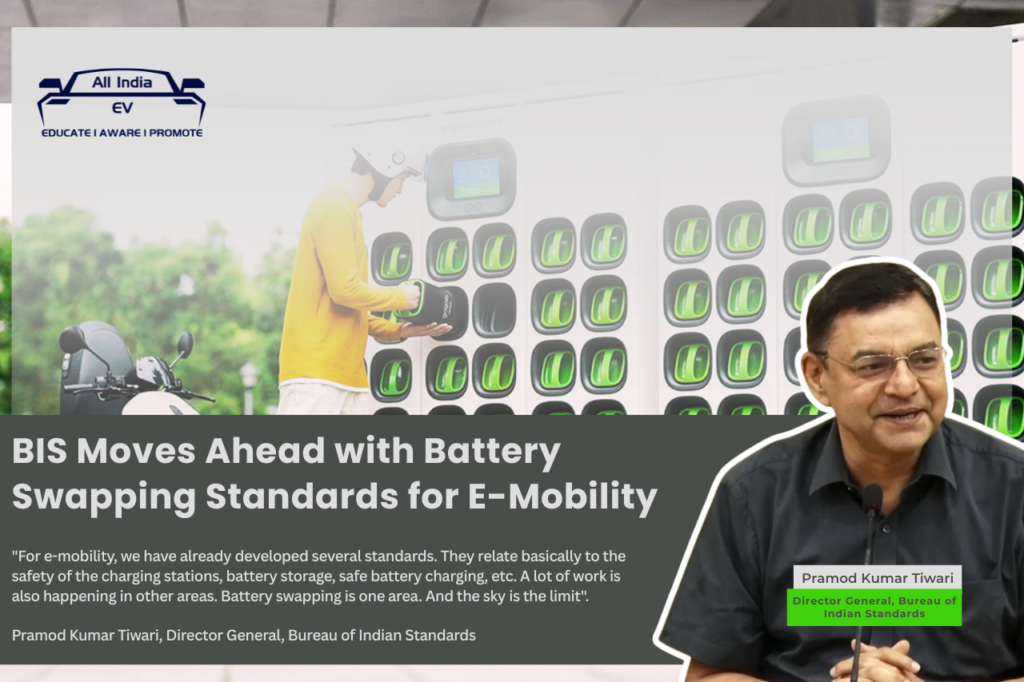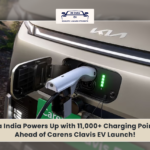
BIS Sets E-Mobility Standards for Charging Safety, Battery Swapping and Storage to Boost India’s EV Ecosystem Growth
The Bureau of Indian Standards (BIS), India’s national standards body, is stepping up efforts to strengthen the country’s electric mobility framework. The organisation has already rolled out multiple standards for charging station safety, battery storage, and charging protocols, and is now actively working on battery swapping standards, according to BIS Director General Pramod Kumar Tiwari.
Speaking on the sidelines of the IEC General Meeting in New Delhi, Tiwari said:
“For e-mobility, we have already developed several standards. They relate to the safety of charging stations, battery storage, safe battery charging, etc. Battery swapping is one area where a lot of work is happening. The sky is the limit.”
Role of BIS in India’s EV Transition
BIS, which functions under the Ministry of Consumer Affairs, Food and Public Distribution, plays a central role in ensuring quality, safety, and reliability across industries. With India pushing aggressively towards electric vehicle (EV) adoption, the need for standardisation of charging infrastructure and battery technologies has become critical.
Tiwari stressed that standards are vital for assuring safety, quality, compatibility, and interoperability in the EV ecosystem. This includes not just EV charging stations but also battery swapping stations, which are expected to play a major role in scaling adoption for two- and three-wheelers.
EV Standards Already in Place
According to Tiwari, several BIS standards have already been notified in areas such as:
- Battery storage systems
- EV charging station infrastructure
- Safe charging protocols
More standards are in the pipeline, he confirmed, as India moves to strengthen its EV ecosystem.
AI Standardisation and Other Focus Areas
Beyond EVs, BIS is also working on artificial intelligence (AI) standardisation. Calling it a fast-evolving technology, Tiwari said the organisation has already worked on definitional aspects of AI and continues to explore new verticals.
“AI needs changes on a regular basis. It is a priority area for us,” he noted.
Certification and Quality Control Expansion
The BIS chief also highlighted efforts under the Compulsory Registration Scheme (CRS) of the Ministry of Electronics and IT (MeitY). Currently, 65 products cannot be manufactured or imported without BIS certification.
At present, nearly 700 products fall under mandatory certification, with more categories expected in the future. However, the final decision on which products should be included lies with respective ministries.
“Our role is to familiarise ministries with new standards and motivate them to bring more products under certification,” Tiwari explained.
Rajiv Gauba Committee to Address Bottlenecks
To further streamline standards and approvals, a high-level committee headed by NITI Aayog member and former Cabinet Secretary Rajiv Gauba is reviewing the challenges industries face. The committee aims to remove bottlenecks in standards and processes that affect productivity and competitiveness.
On its progress, Tiwari confirmed that the “work is in progress.”
Other BIS Initiatives
BIS also runs multiple certification and consumer protection programmes, including:
- Product Certification (ISI mark)
- Management Systems Certification
- Hallmarking of gold and silver jewellery/artefacts
- Laboratory services for industry and consumer safety
On hallmarking, Tiwari said that bullion — referring to raw precious metals like gold, silver, platinum, and palladium — is still under consideration. Discussions with stakeholders are ongoing to resolve challenges before implementing new hallmarking standards.
The Road Ahead for EV Standards
With India aiming for large-scale EV adoption, battery swapping has emerged as a critical enabler, especially for commercial fleets and last-mile connectivity providers. By developing clear, standardised guidelines, BIS hopes to ensure that battery swap networks are safe, reliable, and interoperable, creating a level playing field for manufacturers and service providers.
Experts believe that BIS-led standardisation will boost investor and consumer confidence, helping India scale its EV infrastructure more rapidly.










